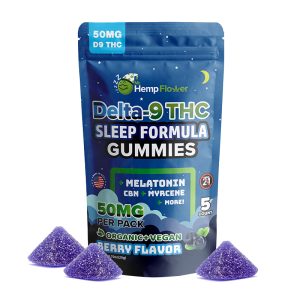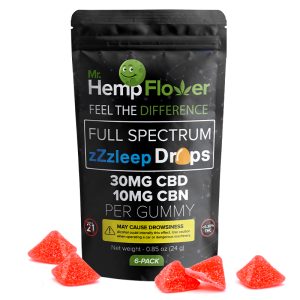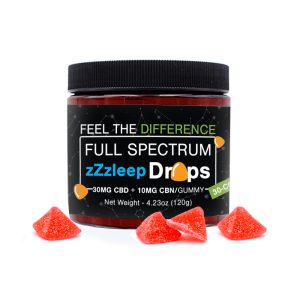CBD and CBN are two cannabinoids with very similar names but different effects. While CBD is known as the go-to cannabinoid for physical discomfort, CBN is best recommended for sleep.
What is CBN? How is it different from CBD? Does CBN make you high? Let’s take a look.
Medical Disclaimer: The following content should be considered informational only and not interpreted as medical advice. Please consult a medical professional before adding a new supplement to your routine.
Last Updated: July 15, 2023
Article Summary
- Cannabidiol (CBD) and cannabinol (CBN) are hemp cannabinoids with similar names but different effects. CBD is non-intoxicating and often used for physical discomfort, while CBN is anecdotally known for its potential sedative effects.
- The hemp plant contains naturally high levels of CBD, while CBN is found in trace amounts because it’s a by-product of THC degradation.
- CBD is non-intoxicating and won’t alter your mind, while CBN is known to produce a slight intoxication in some people.
- Despite differences, CBD and CBN share similarities. They both interact with the ECS, offering potential therapeutic benefits, cause minimal to no adverse effects, and are legally sold across the U.S.
- Both CBD and CBN can be combined to enhance the ‘entourage effect,’ which could be more beneficial than using them separately. There are products available combining these cannabinoids, often recommended for sleep.
- Though its sedative effects are still under debate, high doses of CBN might cause sleepiness or grogginess, hence it’s generally recommended for nighttime use.
What is CBD?
Cannabidiol (CBD) is a primary cannabinoid that naturally occurs in the hemp plant. This compound has a lot of potential therapeutic properties and is known as safe, non-addictive, and non-intoxicating.
CBD is one of the most common cannabinoids, available as an isolate, broad spectrum, and full spectrum product. Unlike THC, CBD doesn’t cause the euphoric feeling or “high” associated with marijuana.
What is CBN?
Cannabinol (CBN) is a minor cannabinoid in hemp created as a by-product of THC’s degradation.
Cannabinoids, including THC, are fragile, volatile compounds that break down easily when exposed to light, heat, and time. So, when THC breaks down over time, for instance, in old cannabis flower, it converts into CBN.
Therefore, CBN is not a naturally produced compound but a by-product of THC’s degradation.
CBN is found in hemp plants in minuscule amounts, while cannabis plants contain it in higher quantities, averaging around 1%. Fresh or live cannabis plants don’t contain CBN.
Read more: The Ultimate Guide to CBN
CBD vs. CBN: Similarities And Differences
Although CBD and CBN are different, they share a few similarities, including:
Summary of Similarities
- Both belong to the group of organic compounds found in hemp known as ‘cannabinoids.’
- Both interact and influence the endocannabinoid system.
- CBD and CBN offer a range of potential therapeutic benefits (many unexplored).
- They can be combined to create a more potent effect or boost the ‘entourage effect’ of a product.
- Both exhibit a few minor to no adverse effects on the user.
- CBD and CBN products are legally sold across the U.S.
Summary of Differences
Cannabidiol (CBD) products are 100% non-intoxicating, which means they won’t get you “high.”
Cannabinol (CBN) products, on the other hand, are known to produce a slight intoxication in some people. This cannabinoid is thought to be around 10% of THC’s potency, so many people don’t feel any intoxicating effects after consuming low doses.
CBD flower, or hemp flower, contains high concentrations of CBD produced naturally.
On the other hand, there’s no natural “CBN flower,” as there’s no way to produce a strain high in CBN.
CBD is an FDA-approved drug for severe forms of childhood epilepsy. It also exhibits potential anti-inflammatory properties and has anecdotal use for pain relief, arthritis pain, anxiety, and sleep issues.
Read more: CBD for Pain Management
CBN is primarily known for its potential sedative effects, but more research is needed on how to actually activate them, as most is anecdotal. CBN also shows potential analgesic, anti-inflammatory, and antibacterial properties.
Anecdotally, cannabis users prefer strains high in CBD because it helps prevent the adverse effects of THC, including paranoia and anxiety.
There are some users who like ‘old cannabis’ strains better because they contain high levels of CBN and make them sleepy. Again, this is anecdotal, as it’s believed that terpenes like myrcene may contribute to the sedative effect of cannabis flower.
Cannabinoids are young, so a full comparison regarding therapeutic uses and benefits between CBD and CBN cannot be made yet.
CBD, CBN, and the Endocannabinoid System
The endocannabinoid system (ECS) is a network of neurotransmitters spread around the body and brain. The two main receptors of the ECS, CB1 and CB2 are located in the brain and immune cells, where they play an important role in mood and digestion.
THC acts on the CB1 receptors, causing the “high” feeling associated with cannabis. CBN also shows an affinity towards the CB1 receptor, similarly to THC. But, because it binds at a much lower strength than THC, CBN doesn’t cause as potent an intoxication.
Studies show that CBD doesn’t have an affinity to the CB1 receptors. It may influence the CB2 receptors, but not directly [1].
CBN is also an agonist to the TRPV2 receptor, which is a protein naturally produced in the body that regulates various biological systems [2].
Activation of the TRPV2 receptor is associated with lower pain sensation, lower blood pressure, bone health, and anti-inflammation. We don’t know the exact mechanism of action of this compound, so more research is needed [2].
Primary Differences Between CBD and CBN
| Cannabidiol (CBD) | Cannabinol (CBN) | |
|---|---|---|
| Potency | Non-intoxicating | Slight intoxication (10% of THC) |
| Natural Presence | In hemp flower | Not in natural strains |
| Approved Use | FDA approved for severe forms of childhood epilepsy | More research needed |
| Potential Benefits | Anti-inflammatory, may relieve pain, anxiety, sleep issues | Possible sedative, analgesic, anti-inflammatory, antibacterial |
| Anecdotal Use | Prevents adverse effects of THC | May induce sleepiness |
| Interaction with ECS | Influences CB2 receptors | Affinity towards CB1 receptors; agonist to TRPV2 |
Table 1: CBD and CBN are slightly different in potency and ECS receptors they bind to in the body. The biggest difference between the two is that hemp flower is rich in CBD, while there’s no natural CBN hemp flower.
CBD vs. CBN: Potential Therapeutic Benefits
Cannabinoid research is still in its infancy. Several studies have shown that CBD and CBN have a few potential benefits.
Benefits And Effects of CBD
CBD is an FDA-approved medication for epilepsy in children. Anecdotally, it helps people who use it for pain management, anxiety, and inflammation.
There are a few studies that support these potential therapeutic properties of CBD, including:
- Fifteen out of eighteen trials have demonstrated a potent analgesic effect of cannabinoids like THC and CBD. Also, CBD could be an alternative to opioids for chronic pain [3, 4].
- Preclinical evidence supports the use of cannabidiol for generalized anxiety disorder, social anxiety disorder and panic disorder. The findings are for acute administration of CBD for these conditions [5].
- One study found that a single dose of CBD (600 mg) can reduce high blood pressure in humans, but more research is needed regarding the long-term implications [6].
As explained by the majority of people who have tried CBD, this cannabinoid exhibits calming effects. Most people react well to CBD, with minimal adverse effects.
Summarized, the use of CBD can yield the following potential benefits [7]:
- Analgesic
- Antioxidant
- Anti-inflammatory
- Antipsychotic
- Neuroprotective
Benefits And Effects of CBN
Researchers are taking steps to discover the therapeutic benefits of cannabinol (CBN). Early research shows that this compound may have potential:
- Analgesic effects: A study found that CBN (and CBD) decreased muscle sensitization in female rats [8].
- Appetite stimulant: CBN affects the same receptors as THC, but differently. Because of that, it may exhibit similar effects to THC, including increased appetite in rats [9].
- Anti-inflammatory effects on skin: CBN is currently being researched for its effects on a skin disease that causes blisters and chronic wounds. So far, it’s been well-tolerated by the subjects and has caused healing.
Cannabinol also has calming, sleepy effects and is generally well received and with minor adverse effects. Summarized, the use of CBN can yield the following potential benefits [10]:
- Anti-inflammatory
- Antibiotic
- Anti-convulsant
- Analgesic
CBD vs. CBN: Which is Better And Can You Mix the Two?
Yes, you can combine CBD and CBN.
Plenty of products combine these two compounds, including our full spectrum CBN Gummies. Our gummies contain 10 mg of CBN and 30 mg of CBD, and users who tried them, recommend them for sleep.
Combining these two cannabinoids and hemp terpenes is beneficial because of the ‘entourage effect.’ This theory suggests that mixing several cannabinoids and terpenes in a product is more beneficial because they tend to work in synergy to improve effectiveness [11].
It’s difficult to find a product with high levels of CBN, so our gummies offer the best way to use these two cannabinoids.
Delta 9 THC Sleep Gummies (With CBN)
Expertly blended with natural ingredients and potent hemp flower extract, each gummy serves a harmonious combination of:
- 10 mg Delta 9 THC
- 2 mg Melatonin
- 2 mg Cannabinol (CBN)
- 2 mg Myrcene
This masterful blend delivers a calming, mildly psychoactive experience. It subtly elevates your mood and guides you to peaceful sleep.
You will savor the taste of natural berry flavors as you immerse in the entourage effect of this full spectrum hemp extract
Full Spectrum CBN Gummies
Bid farewell to sleepless nights with these high-quality gummies, your gateway to waking up refreshed and rejuvenated.
Ingredients:
- 30 mg CBD,
- 10 mg CBN,
- 5 mg THC
- Pineapple and cherry flavor
Immerse in the delicious fusion of pineapple and cherry flavors, perfectly balanced with the soothing benefits of myrcene and bisabolol. a aliquam erat volutpat.
There’s some evidence behind the CBD/CBN combination. One study found that CBD and CBN showed an analgesic effect in animals. The researchers concluded that the effect of this combo wasn’t as strong as THC, but it was still beneficial and non-intoxicating [12].
So, is CBD better than CBN? It depends on what you‘re looking for. CBN may be better for sleep when combined with the right compounds, but CBD is more beneficial for a wider range of ailments.
Chemical Structure
Cannabidiol (CBD) has the same molecular formula, C21H30O2 as THC. CBD contains 21 atoms of carbon, thirty of hydrogen, and two of oxygen.
As an inactive component of Cannabis sativa and a metabolite of THC, cannabinol offers potential anti-inflammatory and immunosuppressive activities.
The molecular formula of CBN is C21H26O2, with a difference of 26 atoms of hydrogen compared to 30 atoms of hydrogen in CBD.
Cannabinol has a molecular weight of 310.437 g/mol, while CBD of 314.464 g/mol.
CBD vs. CBN: Legality
Hemp-derived CBD and CBN are legal in the U.S. under the 2018 Farm Bill.
As long as these two cannabinoids are infused in products with less than 0.3% THC (and are derived from hemp), they are legal to use and possess.
Any product over 0.3% THC is considered marijuana, regardless if it comes from hemp or marijuana.
Potential Side Effects
CBD is known to have few mild to no adverse effects. It’s typically well-tolerated even if consumed in large doses. A negative experience with CBD may occur in sensitive individuals and cause:
- Dry mouth
- Nausea
- Fatigue
- Changes in appetite
- Diarrhea
- Drowsiness
- Allergy (rare)
Similarly to CBD, CBN also doesn’t show significant side effects aside from being considered a sedative. As mentioned earlier, its sedative effects are debatable, but the common side effects of CBN are sleepiness and drowsiness.
What Makes CBN More Expensive Than CBD?
It’s less challenging and expensive to isolate CBD than create CBN, hence the monetary difference.
CBN is a minor cannabinoid, appearing in smaller concentrations than CBD and THC. This factor makes isolating CBN for medicinal or research purposes more challenging.
The conversion of THC to CBN occurs when THC is oxidized or subjected to excessive heat and light. Meaning CBN does not form naturally in large quantities.
Manufacturers extract this compound in a lab setting using complicated processes, which further complicate the task of including CBN in product formulations.
While you can buy CBD at rates as low as $0.10 per mg depending on the quality, CBN might cost up to 10 times as much per mg.
Does CBN Make You Groggy in the Morning?
If you take a high dose of CBN, it could make you groggy.
CBN affects the same receptors in the brain as THC, which is notorious for giving you a next-day “hangover.” The thing is, CBN is much less intense than THC, so it depends on the dosage and how your body receives it.
Some experts don’t recommend taking CBN during the day because it causes sleepiness, but it’s typically recommended to use it at night.
FAQ on CBD vs. CBN
Is CBN legal?
CBN is not on the list of scheduled controlled substances in the US.
But, since this component could legally be considered the breakthrough product of THC, which is a Schedule I substance, sales or possession of CBN products couple potentially be prosecuted under the Federal Analogue Act.
Which is better CBD or CBN?
It is still early to compare CBD to CBN because researchers are still working on discovering the potential benefits of the latter.
But, from what we know so far CBD offer stronger, evidence-based anti-inflammatory, analgesic, antidepressant effects and is non-psychoactive.
Is CBN Psychoactive?
Cannabinol (CBN) is formed when THC is exposed to heat or oxygen.
CBN shows non-psychoactive to mildly intoxicating properties if taken in large doses, but not nearly to the levels of THC.
CBN can be safely consumed in smaller doses without causing a high.
What strains are high in CBN?
If you are looking for a strain that will help you fall asleep without making you high, the Sour Space Candy Hemp Flower by Mr. HempFlower is the ideal solution for your sleeping problems.
The strong terpene profile, such as myrcene, a-pinene, and limonene will make you relaxed and relieve the stress that might be holding you back from having a good night’s sleep.
What are the effects of CBN?
CBN shows analgesic, anti-bacterial, anti-convulsive, anti-inflammatory, stress-relieving, and sedative effects.
What is the difference between CBD and CBN?
There are several differences between CBD and CBN, including: CBD and CBN are produced within the cannabis plant differently
So far, scientists have discovered that CBD shows potential in treating more conditions than CBN CBD and CBN have different chemical structure CBD is non-intoxicating even in large doses, while CBN can be mildly intoxicating in larger doses In general, CBD offers more benefits than CBN
What is CBN good for?
CBN is a great sedative, which means it may be a potential remedy for sleeping problems.
Studies show potential benefits of CBN for pain-relief, insomnia, may promote growth of bone cells, helps with burns, seizures and is a great appetite stimulant.
Does CBD turn into CBN?
No, THC turns into CBN, while the biosynthesis of CBD and THC in the hemp plant follow a similar pathway.
Cannabinol (CBN) is the bioproduct of THC as THC can over time, or if exposed to heat convert to CBN.
What temperature does CBD degrade?
The boiling point of CBD is in the range of 160-180°C.
What does CBD and CBN do?
CBD acts as an anti-inflammatory, anticonvulsant, antioxidant, antipsychotic, and antiemetic agent, which is why it is considered as a potential remedy for inflammation, epilepsy, pain, anxiety, vomiting and nausea, and mental health conditions.
CBN has a variety of medical properties, with a potential to generate bone tissue, act as a potent sedative for insomnia and shows anti-inflammatory properties for pain relief.
Does CBN help you sleep? Does it help with anxiety?
Yes, CBN is one of the most effective cannabinoids out of all 113 discovered so far. It acts as a great sleep aid or sedative.
CBN also shows powerful anxiolytic effect that relaxes the mind and the body, similarly to diazepam, a prescription drug for anxiety disorders.




